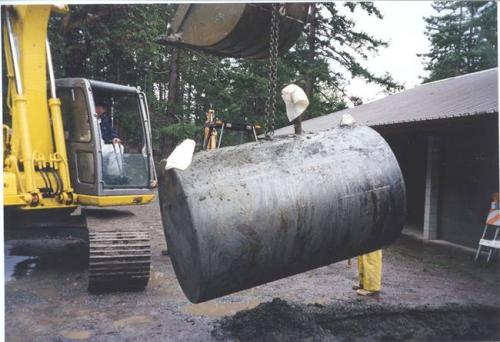Environmental Health & Safety (EH&S) oversees compliance activities for contaminated sites on UW properties, including underground storage tanks.
Leaking underground storage tanks (USTs) containing petroleum or other hazardous substances pose a threat to human health and the environment, as they can contaminate soil or groundwater, potentially contaminating drinking water aquifers.
The Washington State Department of Ecology (Ecology) regulates the installation, management, and monitoring of USTs to prevent releases to the environment per Chapter 173-360 of the Washington Administrative Code.
Ecology publishes standards and requirements for installation, tank construction, tank testing, leak detection, spill containment and overfill protection. Ecology issues permits for tank operation and enforces the requirement that testing be done only by certified tank testers. Ecology also regulates the temporary and permanent closure and decommissioning of USTs.
Report leaks
Underground storage tanks at the UW were installed and are routinely maintained in accordance with Ecology regulations and guidance. However, if you are the owner or operator of a UST that you suspect (or know) has leaked, you are required to report the leak to EH&S immediately:
- During regular business hours (Monday-Friday, 8:00a.m. to 5:00 p.m.) call 206-616-5835.
- Outside of regular business hours, call UW Police at 206-685-8973 and ask to be connected to the EH&S Staff on Call.
We are required to report petroleum leaks within 24 hours of detection to Ecology. Ecology will require follow-up soil and groundwater investigation and/or cleanup if a leak has occurred.
Design requirements
Please refer to the Environmental Protection Requirements in the Environmental Health & Safety section of the UW Facilities Design Standards, or call EH&S at 206.616.0585 for assistance UST requirements, such as required maintenance records, Ecology notifications, inspections and changes in tank use or content.
Services available
EH&S provides the following services:
-
Guidance on UST decommissioning, closures, temporary closures, and leaks
-
Ecology installation requirements, UST registrations, and Ecology compliance inspections
-
UST record-keeping requirements
Frequently asked questions
Please contact EH&S at 206.616.0585 as soon as possible during regular business hours (Monday-Friday, 8:00a.m. to 5:00 p.m.). Outside of regular business hours, call UW Police at 206-685-8973 and ask to be connected to the EH&S Staff on Call.
We are required to report petroleum leaks from an underground storage tank within 24 hours of detection. Ecology will require an environmental investigation and cleanup if a leak has occurred.
The Washington state regulations can be found in Chapter 173-360 of the Washington Administrative Code.
The Environmental Protection Requirements in the Environmental Health & Safety section of the UW Facilities Design Standards contains information on installation, decommissioning, and maintaining underground storage tanks.
